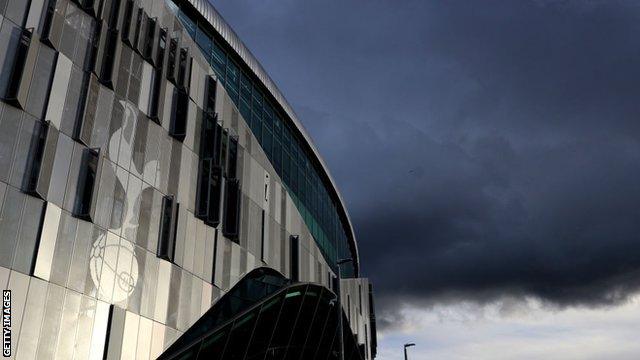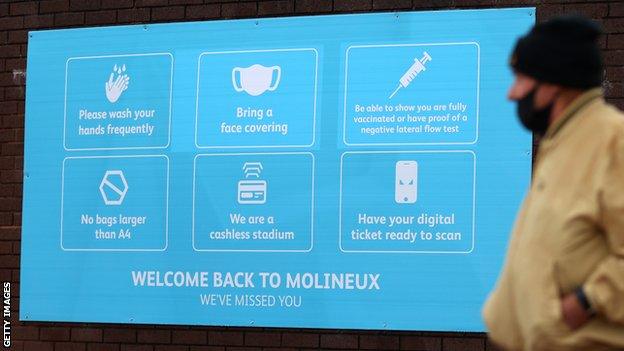Premier League agrees new Covid measures to stem outbreaks at clubs
- Published

Tottenham's match against Brighton was called off because of an outbreak at Spurs
Premier League players and club staff will need to take a lateral flow test every day to get into training grounds under new measures agreed on Tuesday to combat the coronavirus Omicron variant.
The action is aimed at stemming the rising number of positive Covid cases.
The Premier League confirmed on Monday there had been a record 42 positives over the previous seven days.
It is the highest figure recorded since Covid testing began as part of Project Restart during the 2019-20 season.
Previously, the most positive tests returned in a week this season was 16 from 16-22 August, when there were 3,060 tests.
Outbreaks at Tottenham and Manchester United have caused the postponement of two league games within the space of three days, while Brighton, Leicester, Aston Villa and Norwich have all confirmed cases.
The Premier League has turned down a number of other requests this week for games to be postponed.
Leicester failed in their attempt to have their home game against Tottenham on Thursday postponed, Foxes manager Brendan Rodgers said.
After losing four players to coronavirus concerns before a 2-0 loss to Aston Villa on Tuesday, Norwich manager Dean Smith said there should be a "magic number" for the threshold of cases in order for a fixture to be called off.
League rules say a match cannot be postponed if clubs have 14 or more players available.
However, each request will be considered on an individual basis with a number of factors - including whether the training ground has been forced to close and if the outbreak is controllable - also taken into account.
In addition to the daily tests to get into training grounds, players and staff will now have a PCR test at least twice a week, which was the case last season, before it was changed to lateral flow tests in the summer.
It is anticipated the measures will be implemented quickly in an attempt to stem the spread of the new Omicron variant. Additional mask wearing, limiting of time spent receiving physical treatment and social distancing are also being advised to reduce the risk of further cases.
With the season about to enter the busy festive programme, clubs will want to avoid postponements which could create a fixture backlog and potentially even leave the league open to demands for rebates from broadcast partners, which had to be paid when the 2019-20 season was suspended at the start of the pandemic.
However, West Ham manager David Moyes believes the schedule is "playing a part" in transmission, adding: "Players are getting very little time to recover and when you are run down, you are more likely to get the virus.
"What we are putting the players through at the moment... that is showing with the number of players who are catching the virus."
Last week, following the introduction of new coronavirus rules in England, the Premier League told clubs to return to emergency measures, including social distancing and wearing masks.
Brighton chief executive Paul Barber told BBC Sport his club is "now moving to testing three times a week" for players and the staff that work "in the bubble" to try to limit the number of infections that are spread from one player to another.
And from Wednesday, fans will need to show proof of double vaccination or a negative test to attend sporting events with crowds of more than 10,000 people in England. This includes Premier League games.
Stadiums have been free to operate at full capacity since final Covid restrictions were lifted in July.
If further restrictions are imposed by the Government, the Premier League is hoping to show through data that its matches could continue to be staged safely.

Fans will need a Covid pass to attend Premier League games from Wednesday
Which Premier League clubs have Covid-19 outbreaks?
Tottenham's Europa Conference League match against Rennes was called off on Thursday because of the outbreak that resulted in the Brighton postponement.
Also on Thursday, a number of Leicester players did not travel to Italy for their Europa League group game against Napoli because of positive Covid-19 tests.
Late on Monday, the Premier League confirmed Manchester United's game at Brentford had been postponed after the Old Trafford club expressed safety concerns following the closure of their training ground for 24 hours to reduce the risk of transmission.
Aston Villa boss Steven Gerrard confirmed "a couple of staff members and a couple of players" have tested positive but insisted the "vast majority" were negative. Gerrard's team were able to play Tuesday's Premier League match at Norwich who - as their manager Smith said above - were without four players because of Covid-related concerns.
At Brighton, head coach Graham Potter says there are "three or four" positive cases.
In the Championship, QPR's second game in a week has been called off with "a number of positive Covid-19 cases" in their first-team squad.
Saturday's home game with Swansea is off, after Monday's trip to Sheffield United was also postponed.
What are Premier League managers saying about Covid-19?
Before the postponement, Brentford boss Thomas Frank echoed Arsenal's Mikel Arteta in calling for greater clarity from the Premier League over fixture changes because of Covid-19.
Manchester City manager Pep Guardiola said he encourages his players to get a vaccine booster, adding: "We speak with the players every day to say be careful. Stay healthy, wear masks, social distance."
Liverpool manager Jurgen Klopp says the vaccination status of his squad is "good", adding those who are eligible have had the booster.
"The whole vaccination thing is a question of loyalty, solidarity and togetherness. Everyone working at the training ground is at least double-vaccinated and will get the booster as soon as possible," said the German, who confirmed there were no positive cases in his squad on Tuesday.
Conversely, Burnley manager Sean Dyche revealed that he does not "preach to the players" on vaccines, but Norwich's Smith described the Canaries as "highly vaccinated".
Dyche added: "We certainly have players who don't have the full vaccination. Everyone has a choice, personally I have all three as I think it's right to do so."
Sports minister Nigel Huddleston said he "appreciated" football players and staff "testing at large volumes" and said the current measures were "proportionate" and "right for now".
What about the EFL?
In the 2020-21 season, the Professional Footballers' Association paid an estimated £5m bill for players to be tested across the English Football League. But up to this point in the 2021-22 season, there has been no mandatory requirement for clubs to test players.
The EFL had issued guidance in July around two 'green' and 'red' protocols. Clubs have been following 'green' protocols of daily screening for symptoms, with stricter 'red' protocols including testing only triggered by any local outbreaks, further restrictions imposed by the government - as has happened in recent days.
A decision to move to 'red' protocols would be made by the league in consultation with the clubs.
The EFL told BBC Sport on Tuesday that "conversations on Covid matters are ongoing".
In the meantime, fixtures are being affected in Championship, with QPR on Tuesday forced to postpone a second match in a matter of days amid a Covid outbreak at the club.
What about in Scotland?
No new official guidelines have been put in place yet - beyond the ongoing use of lateral flow testing - albeit some clubs are taking their own extra precautions around testing.
New advice was given at the weekend around travel, with clubs told if anyone on a team bus tested positive, all passengers would have to self-isolate for 10 days.
However, that was revised after clarification from the Scottish government. Now only household contacts or those not double-jabbed will not be able to be cleared by a negative test.

Our coverage of your Premier League club is bigger and better than ever before - follow your team and sign up for notifications in the BBC Sport app to make sure you never miss a moment
